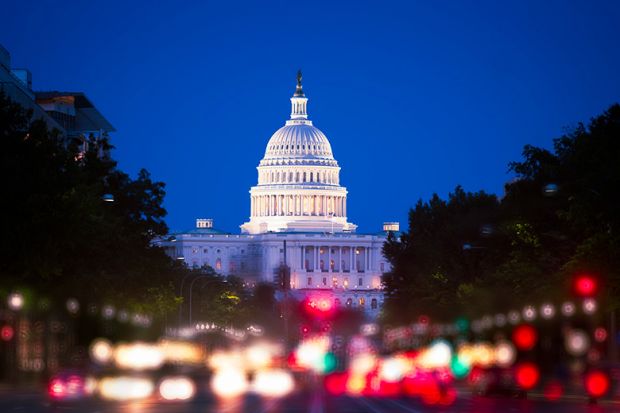US-China tensions have created “big opportunities” for Australian universities, as mounting rivalry and security concerns push America closer to “like-minded countries”, a Canberra forum has heard.
Australia’s ambassador to the US, Arthur Sinodinos, said a “bipartisan” adversarial approach to Beijing among US politicians – coupled with disquiet over America’s eroding pre-eminence in global research and development – had boosted antipodean prospects for scientific and commercial collaboration.
“This new world of cross-cutting science and national security is likely to result in more interest in Five Eyes cooperation in university research,” Mr Sinodinos told the Universities Australia (UA) conference. “There’s so much going on here that we in Australia can take advantage of.”
He said there were no “boosters of China” left in Congress, with American lawmakers now united in their determination to “bolster US scientific capabilities in the face of the growing strategic competition”. But while the US had accounted for 70 per cent of global R&D in 1960, its share had slumped to 25 per cent “with China at almost equivalent level”.
“This is driving American policymakers to think differently about research and innovation,” he continued. “They want closer collaboration with allies and like-minded countries in key areas of science and technology.”
Mr Sinodinos nominated “critical minerals” as a particularly promising area for cooperation, as the US and Australia engaged in a “dialogue” over the production and processing of elements used in electric vehicles, renewable energy storage and sensitive defence materials.
“This will counter the concentration of market power in China for rare earth elements," he said. "[It] is an area which can really stimulate innovation and research. We are in a prime position to benefit from that.”
The 2018 establishment of the Australian Space Agency also created new opportunities for cooperation. Mr Sinodinos said initiatives to involve Australian firms in the supply chains for NASA’s Moon and Mars missions would “enhance local space-industry capabilities” while providing jobs for graduates.
He also highlighted opportunities in fields with potential military application, such as artificial intelligence, quantum computing and hypersonics. In-Q-Tel, the venture capital arm of the US intelligence community, was seeking out Australian technologies with intelligence and security application.
“We’re finding a lot of interest in the US in investing in high-tech sectors in Australia,” Mr Sinodinos said, highlighting recent American venture capital investments in Australian mineral and technology companies.
“This is our moment to take our close relationship with the US in research and innovation to the next level," he added. “America is re-emerging fast from the pandemic. The rate of growth in the US in the second half of the year is going to be something like 6.5 per cent. They’re very bullish in their forecasts of what the future looks like. In some sectors here, they talk about the ‘roaring 20s’.”
But Australian universities would need to be mindful of American sensitivities around research security and integrity amid a “bipartisan commitment” to tackle foreign interference and intellectual property theft.
Mr Sinodinos said US research policy and disclosure rules had been tightened in recent years, and this was likely to continue: “Our American partners are also watching very closely how we address issues like foreign interference in Australia. This is not an issue that’s going to go away.
“This means that Australian researchers and universities need to keep up to date with changes in the US system, and ensure that their own processes for due diligence and compliance are robust.”




